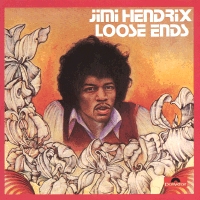This article includes a list of general references, but it lacks sufficient corresponding inline citations .(July 2019) |
| Loose Ends | ||||
|---|---|---|---|---|
 UK and Japan cover | ||||
| Compilation album by | ||||
| Released | February 1974 [a] | |||
| Recorded | July 1967 – July 1970 | |||
| Studio | Electric Lady, Record Plant, and Baggy's Studios in New York; Mayfair Studios in London | |||
| Genre | Rock | |||
| Length | 35:09 | |||
| Label | Polydor (international) Barclay (France) | |||
| Producer | John Jansen | |||
| Jimi Hendrix UK chronology | ||||
| ||||
| Alternative covers | ||||
 French cover of Loose Ends | ||||
 German cover of Loose Ends | ||||
| Review scores | |
|---|---|
| Source | Rating |
| AllMusic | |
Loose Ends is a posthumous compilation album [4] by American guitarist Jimi Hendrix,released in February 1974 in the UK. [1] [2] It was the fourth and last Hendrix studio album released posthumously by manager Michael Jeffery. The album features a collection of outtakes and jams,with the exception of "The Stars That Play with Laughing Sam's Dice" which is the sole authorized track by Hendrix,in a new stereo mix by Eddie Kramer.
Contents
The album was engineered,mixed and compiled by John Jansen,who is listed on the record's sleeve as "Alex Trevor" because he did not wish his name to be on the album's credits. Additional engineering was provided by Eddie Kramer,Dave Palmer,Kim King,Gary Kellgren,Jack Adams,Tom Flye and Jim Robinson.
Reprise Records (Jimi Hendrix' label at the time),declined to issue this album in the US and Canada as they considered the material below standard. All the tracks on this album have been subsequently re-released on other official albums,in some form,except "Blue Suede Shoes". The UK,French,and German releases had different covers.